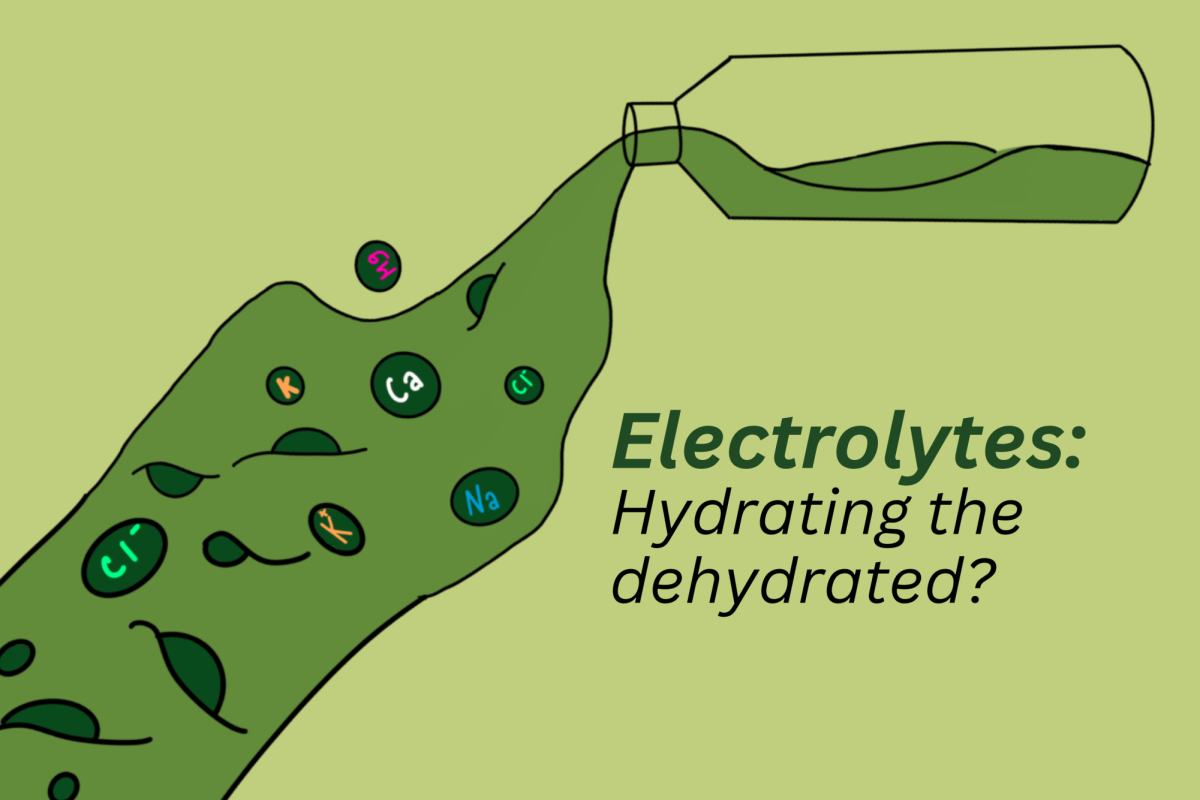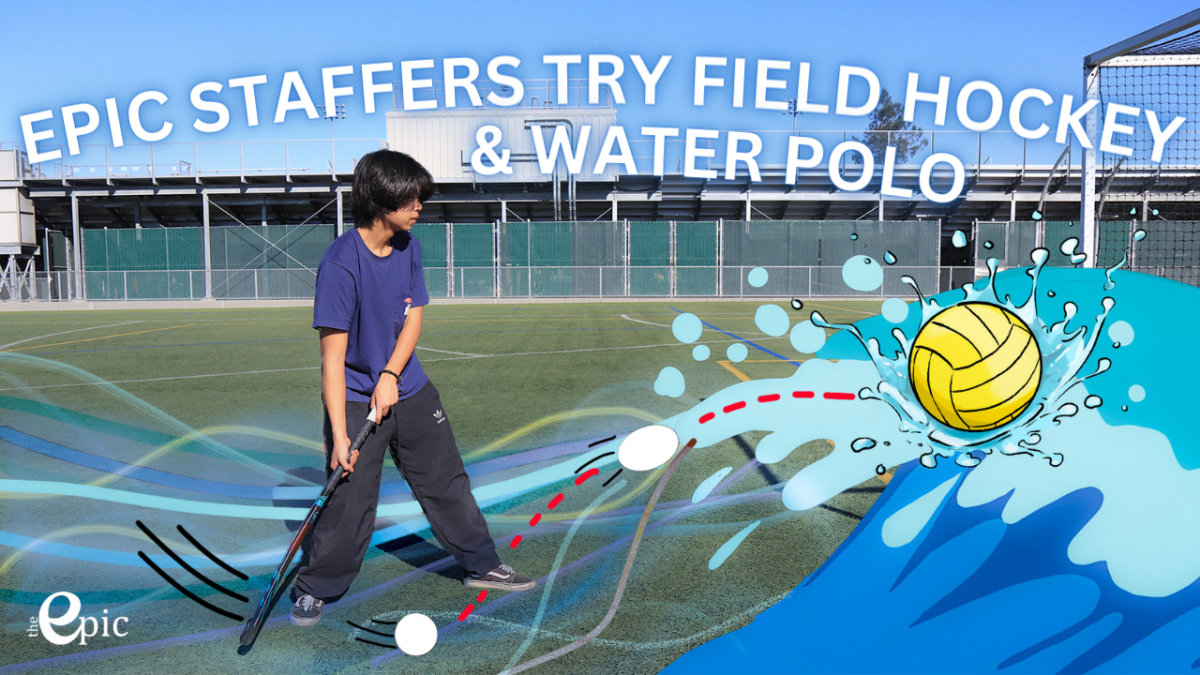The familiar, unwanted aches during an intense game can be an athlete’s worst nightmare. As Gatorade described in a 2023 comedic advertisement with basketball player Damian Lillard, it is as if athletes simply “disappear in clutch moments due to falling hydration levels.” Sporting continual edits of athletes vanishing into thin air while performing activities, the ad ended with a simple motto: “Gatorade — rehydrate, replenish, refuel,” connecting to the general consensus of sports electrolyte drinks, yet the impact of electrolytes may be less clear cut than what online media reports.
Electrolytes are electrically charged minerals that the body needs to regulate hydration, balance pH levels and maintain neural activity. Drinking electrolytes replenish those lost through sweat during training when dissolved in the body. Of these, the most crucial electrolytes for main bodily functions are sodium, calcium, potassium, chloride, phosphate, bicarbonate and magnesium.
The popular image of electrolytes appears in the form of replenishing powdered or liquid drinks for athletes, packaged in bright colors to emphasize the rejuvenating qualities of electrolyte products. Common brands include Gatorade, Drip Drop and kinds of coconut water. To understand how electrolytes deliver on the promises of rehydration brands claim, it is crucial to delve into its scientific properties.
However, the amount of each type of electrolyte in electrolyte products can vary drastically depending on the brand. For instance, BodyArmor drinks contain high amounts of potassium due to their coconut-water base while Gatorade contains more calories and sodium.
“The biggest mistake I see athletes making is not consuming enough sodium around workouts, as this is the main electrolyte lost in sweat and needs replenishing in order to rehydrate and restore fluid balance properly,” said Erin Pettygrove, associate athletic director and sports nutritionist at Santa Clara University.
The multitude of ingredients in sports drinks can lead to electrolyte imbalances; similar to how marathon runners can experience hyponatremia, or over-hydration and sodium loss. An abundance of electrolyte products and lack of proper hydration can result in hypernatremia — a surplus of electrolytes and not enough water to balance them out. Electrolytes can slow the loss of sodium but don’t necessarily prevent any diseases.
“Rather than assuming that you’re dehydrated and drinking more electrolyte drinks, it’s important to check in with yourself and assess your symptoms,” said Dr. Grant Lipman, M.D., an emergency medicine physician and former professor of emergency medicine at Stanford University. “By drinking too much, no matter what you drink, you’re still going to dilute the salt levels in your blood.”
A 2021 study led by Lipman found that 41 of the 266 marathon runners enrolled had sodium imbalances by the end of the race: eleven experienced exercise-associated hyponatremia due to insufficient sodium and 30 developed hypernatremia, with excess sodium in their blood.
Thus, while electrolyte products offer a unique advantage compared to regular water in rehydration, the common misconceptions surrounding electrolytes can result in electrolyte misuse. The association between electrolytes and hydration has often been muddled through online advertising as the cure to dehydration. In reality, electrolytes take part in a complex system as they enter the bloodstream and concentrate the blood with necessary minerals, directing water towards the cells that need them most.
“If your body was a car, and you didn’t have the right kind of fuel — whether that’s electrolytes, calories or fluids — your body, just like the car, is not going to run properly,” PE teacher Ray Wright said.
When taken in moderation, electrolytes can maintain a healthy homeostasis in the body, which results in the perceived effect of fewer cramps and reduced risk of fainting. For the average person, a consistent, balanced diet is enough to make up for the natural loss of electrolytes. In professional athletes who typically sweat more, other supplements or drinks may be used to help restore electrolyte levels.
“I love drinking Gatorade after cross country meets,” junior Shannon Tai said. “It’s a boost of sugar and tastes good.”
In regards to performance benefits of taking electrolytes, there have been mixed results from studies and surveys, showing that while there is no discernable difference between athletes who hydrate exclusively with electrolytes and plain water, the combination of electrolytes with simple sugars is helpful for performance.
“Over the years, I’ve heard many experts speak about nutrition in athletes,” Wright said. “The one that stands out the most was the nutritionist from the Pittsburgh Steelers, Pittsburgh Pirates and the University of Pittsburgh. She stated that the best thing to replenish your fluids with is water. There’s nothing wrong with having sports drinks sometimes, but some of them have a little too much sugar.”
Despite the possible side effects, though, electrolytes still offer convenient alternatives to quick hydration and hormone regulation. There are many types of electrolytes and avenues to obtain them, which emphasize the importance for athletes to know what works best for their body, whether it be through targeted electrolyte products or salty snacks high in sodium. Athletes can also calculate their sweat rate and which electrolytes they lose more to better understand their physical conditions.
“At the end of the day, listening to your body and ‘drinking to thirst’ regardless of what you’re drinking is most important,” Lipman said.













































































